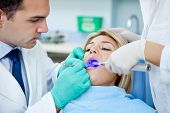Best treatment for bad breath ? Top 10 tips to prevent and cure halitosis by checking for common causes, symptoms and taking proper treatment. Bad breadth is medically called halitosis and can result from poor dental health habits and may be a sign of other health problems, too. Bad breath can also be made worse by the types of foods you eat and other unhealthy lifestyle habits.
Top 10 best tips to prevent and get rid of bad breath !
It is important to go through the following checklist to verify the causes of bad breath and do the necessary treatment if required.
Gum disease
Persistent bad breath or a bad taste in the mouth may be a warning sign of gum (periodontal) disease. Gum disease is caused by the buildup of plaque on teeth. Bacteria cause the formation of toxins to form, which irritate the gums. If gum disease continues untreated, it can damage the gums and jawbone.
Other dental causes of bad breath include poorly fitting dental appliances, yeast infections of the mouth, and dental caries (cavities).
Dry mouth
The medical condition dry mouth (also called xerostomia) also can cause bad breath. Saliva is necessary to moisten the mouth, neutralize acids produced by plaque, and wash away dead cells that accumulate on the tongue, gums, and cheeks.
If not removed, these cells decompose and can cause bad breath. Dry mouth may be a side effect of various medications, salivary gland problems, or continuous breathing through the mouth.
Good oral hygiene is important
Brush twice a day with fluoride toothpaste to remove food debris and plaque. Brush teeth after you eat (keep a toothbrush at work or school to brush after lunch). Don’t forget to brush the tongue, too.
Use floss or an interdental cleaner to remove food particles and plaque between teeth once a day. Rinse with an antibacterial mouthwash twice a day. Dentures should be removed at night and cleaned thoroughly before being placed in your mouth the next morning.
Check watch you eat
What you eat affects what you exhale. That’s because as food is digested, it’s absorbed into your bloodstream and is then expelled by your lungs when you breathe.
Eat a healthy, balanced diet and regular meals. Certain diets — such as extreme fasting and very low-carb diets — can give you bad-smelling breath.
Consider snacking on raw carrots, celery, or apple slices. It’s good to have a nice watery vegetable in there – something like celery – that will help clear your mouth of debris.
Avoid breath busters such as garlic, onions, and some other spicy foods. Chronic garlic users cannot only have chronic bad breath, they also often have body odor.
Drink lots of water
If you can’t brush your teeth after a meal, drinking a lot of water can help speed up the process of cleaning harmful bacteria and debris from between your teeth.
Drinking milk can even help deodorize some offensive breath odors. Avoid sugary drinks.
Be careful with breath mints
Sugar-free mints are OK for a quick fix but only mask the offensive smell and don’t do anything to remove harmful bad bacteria.
Do not give into temptation to pick up a sugary mint as you leave your favorite restaurant, since the sugar will only sit on your teeth and make the problem worse.
Don’t smoke or use other tobacco products and cut back on alcohol
Cigarettes, pipes, and snuff can foul your breath. Smoking can give people horrible breath.
Also alcohol can lead to a dry mouth. Too much beer, wine, and hard liquor can make your breath reek for up to eight to 10 hours after you finish drinking.
Avoid drying medication
Try not to take antidepressants, diuretics, pain relievers, and antihistamines unless it is absolutely medically necessary. These drugs inhibit saliva flow and can cause chronic dry mouth.
Eat fibrous fruits and vegetables
One of the best ways to remove bacteria in the mouth is to eat an apple a day. It helps moisten the mouth, too. Also take a dietary supplement – Vitamin C, Vitamin D, Vitamin E, and Vitamin B are effective at helping your body eliminate excess mucus and toxins naturally.
Rule out other possibilities
Several internal medical conditions also can cause your breath to go downhill fast. They include diabetes, liver disease, respiratory tract infections, and chronic bronchitis.
You’ll want to see your doctor to rule out things like acid reflux and postnasal drip.
Points to remember:
Halitosis is a medical condition that lowers self-esteem and affects everyday life and personal relationships. People with chronic or recurring bad breath often lose their self-confidence. It can be difficult to know if you have this problem, because it is often challenging to pick up on one’s own scent.
Furthermore, family members and colleagues may not feel comfortable telling you. One of the best ways to find out if you have foul breath is to lick the inside of your wrist, wait five seconds, and then take a whiff.
RELATED TOPICS
Personal trainer certification
Personal injury lawyers in Phoenix
Online medical assistant schools



